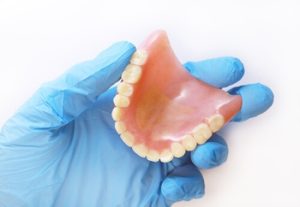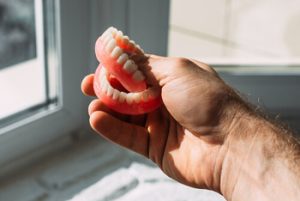Deciding on the right denture type can make a big difference in how you feel, eat, and speak every day. With several choices available, knowing which one suits your lifestyle and preferences is key. Everyone’s mouth is different, which means no one-size-fits-all answer will do. Understanding the different types of dentures is the first step to finding what feels natural and works for you. Let’s explore what sets each type apart and how they’re made to fit real lives like yours.
 What Are Dentures?
What Are Dentures?
Replacing missing teeth can change how you eat, speak, and feel each day. Dentures are one way to restore your mouth’s function using carefully shaped artificial teeth that sit comfortably in the upper or lower jaw. They are created to match your facial structure while working alongside any remaining teeth. Traditional dentures have been used for years, but modern versions now offer improved comfort and a more natural appearance. Whether you are missing one tooth or several, dentures provide a practical solution that blends form and function. They allow you to regain your bite and restore confidence without needing a permanent procedure.
How Do Different Dentures Compare in Terms of Functionality and Comfort?
Choosing the right denture type is an important decision that can affect how you eat, speak, and feel day to day. Understanding how each option performs in terms of comfort and functionality can guide you toward a more confident and stable solution.
Everyday Functionality with Complete Dentures
Complete dentures are often recommended when all teeth in an arch are missing. These removable prosthetics restore basic chewing and speaking abilities. While they can be functional, their stability depends heavily on fit and jaw shape. Adhesives may be used to improve hold, but some movement might still occur, especially while eating tougher foods. They serve their purpose but may need regular relining to remain effective as the jawbone changes.
Added Comfort from Partial Dentures
For those who still have some remaining natural teeth, partial dentures offer targeted support. These dentures typically anchor to adjacent teeth, offering more stability than a full denture. Because they don’t cover the entire arch, they often feel less bulky. They are generally easier to adapt to and are a good choice for those who want to replace missing teeth while keeping their existing ones functional.
Stability and Strength of Implant Supported Dentures
Implant supported dentures provide a more fixed solution. Anchored directly to dental implants, these dentures reduce movement and often feel more like natural teeth during eating and speaking. Their added stability enhances comfort, particularly for lower arches where removable dentures often shift. Although they involve a more complex process, their performance is often worth the investment for those wanting long-term comfort.
Immediate Dentures and Initial Adaptation
Immediate dentures are fitted directly after tooth removal, offering a quicker aesthetic solution. However, since they are made before the gums fully heal, they may require adjustments over time. In terms of function and comfort, they offer short-term benefits but often need future replacement or relining to match the changing shape of the mouth.
Flexibility and Feel of Snap In Dentures
Snap in dentures use small attachments to connect with implants, offering a secure but removable option. They provide more freedom than fixed dentures but still reduce the slipping associated with traditional models. This blend of security and removability appeals to many wearers seeking a mix of stability and convenience.
Matching Denture Choice to Your Lifestyle

Understanding how comfort and function work together helps many patients choose the right dentures. A good denture supports chewing and helps people feel confident. Comfort includes how the denture feels and how natural it looks. Some prefer easier removal, while others want a secure fit. Dentures that balance support and appearance are often more personally satisfying overall.
What Can You Expect During the Denture Fitting Process?
Knowing what to expect from the denture fitting process can ease uncertainty and help you prepare for the steps ahead. Every stage has a purpose, and understanding each one allows you to feel more comfortable as you move toward a new smile.
Initial Visit and Assessment
The process begins with a consultation where your dental history and current oral condition are reviewed. This appointment gives your dentist a chance to examine your gums, jaw, and any remaining teeth. If extractions are required, they’ll be planned at this stage. The aim is to determine the type of denture that suits your needs, whether full or partial and to establish a clear plan for your treatment timeline.
Impressions for Custom Fit
Once your oral condition is assessed, the next step is taking impressions of your mouth. A mouldable material is placed in a tray and gently pressed against your upper and lower arches. These impressions are used to create a model of your mouth, capturing its shape, contours, and bite alignment. Accurate impressions are crucial because they influence how well the dentures will fit and function.
Bite Registration and Jaw Movement
After the initial impressions, you’ll be asked to bite into a wax block or a similar device. This helps record how your upper and lower teeth come together. It also measures the movement of your jaw and the space between arches when you close your mouth. This step ensures your new dentures support proper speech, comfort, and chewing once they’re in place. A precise bite record also helps with the correct vertical dimension, which affects facial balance.
Selecting Shade and Shape
During this stage, your dentist will guide you through choosing the size, shape, and colour of the artificial teeth. The goal is to create a natural appearance that matches your facial features and, where possible, your remaining teeth. This step often includes looking at samples or photos, helping to select teeth that align with your preferences. For many patients, this is the stage that begins to bring their future smile to life.
Wax Try-In Appointment
Before your final denture is made, a wax try-in is created using the initial impressions and chosen teeth. This temporary version allows you and the dentist to preview how the denture will look and feel. You’ll be asked to speak, bite, and smile during this appointment to test comfort and function. Adjustments can be made at this point before the final version is crafted. It’s an essential stage that ensures satisfaction before moving forward.
Final Denture Placement
Once you and your dentist approve the wax try-in, the final denture is created. This step involves sending the approved version to the dental laboratory, where the permanent set is fabricated. During the fitting, your denture is placed and checked for tightness, comfort, and appearance. Small adjustments may be made on the spot. You’ll leave this appointment wearing your new denture with guidance on what to expect in the early days of use.
What Are the Key Advantages of Wearing Dentures?
Exploring the advantages of wearing dentures can help you understand how they improve not only your appearance but also your everyday life. For those managing missing teeth, the benefits go beyond simple function and influence how you speak, eat, and engage with others.
Restore Speech and Confidence in Conversations
Teeth play an important role in how we form words and express ourselves. Missing several teeth can make certain sounds harder to pronounce or affect the way your voice carries. Dentures support clearer speech by filling the gaps that disrupt airflow or tongue placement during speaking. Over time, many people regain the confidence to speak without hesitation in public or social settings. With improved speech comes a renewed sense of ease in daily communication, both personal and professional.
Support Normal Eating Habits Again
Eating a balanced variety of foods can become difficult when chewing feels uneven or painful. Dentures help restore biting and grinding surfaces, making it easier to enjoy different textures and food types again. With improved chewing function, people often find themselves expanding their meal choices, which can contribute to better nutrition. Whether it’s enjoying crisp fruit or a tender piece of meat, dentures make meals more comfortable and enjoyable. A secure fit helps minimise discomfort during chewing and prevents food from getting trapped in gaps.
Maintain Facial Structure and Jaw Position
When teeth are missing, the jawbone and surrounding muscles may shift, which can lead to a sunken appearance over time. Dentures offer structure and support to help preserve facial balance and prevent changes in muscle tone around the mouth. This stability is particularly noticeable in the cheeks and lips, where the added volume helps maintain a natural look. Even removable dentures provide enough support to discourage drooping or sagging in the lower part of the face. Keeping the jaw in proper alignment also reduces pressure on joints and muscles.
Provide a Natural-Looking Smile
A complete smile can have a strong influence on self-esteem and how you carry yourself. Modern dentures are designed to look as close to natural teeth as possible, with careful attention paid to size, shape, and colour. Whether you are smiling in a photo or greeting someone new, the realistic appearance of dentures can make you feel more at ease. With options that match your facial features and skin tone, the results often blend in so well that others may not notice the difference.
Offer a Practical and Accessible Solution
Dentures replace multiple or all missing teeth without requiring surgery or invasive procedures, making them a more accessible option for many people. The process of getting dentures is straightforward and usually completed in stages, allowing for gradual adjustment and comfort. For individuals seeking a reliable and non-permanent alternative, removable dentures offer flexibility. They can be removed for cleaning and easily adjusted if oral conditions change over time.
Protect Oral Function as a Whole
Replacing missing teeth does more than improve looks. Dentures help maintain balance across your bite, reducing uneven pressure that might wear down remaining natural teeth. They also prevent surrounding teeth from shifting into open spaces, helping preserve alignment and jaw movement. Wearing dentures keeps your mouth working in harmony, which plays a vital part in preserving long-term oral function.
 What Factors Affect the Cost of Dentures?
What Factors Affect the Cost of Dentures?
The dentures cost can vary based on several important considerations. The type of denture chosen, whether full or partial, influences how much you may need to pay. Materials also play a role, with flexible or lightweight options often priced higher due to added comfort. The number of missing teeth and the complexity of the design can affect the time and customisation required. Additional steps like fittings, adjustments, or relines may also impact the total cost. Location and the level of detail provided by the denture clinic can further shape the final price.
Let’s Find the Denture Style That Suits You
Finding the right fit among the many types of dentures can feel overwhelming, but with the right support, it becomes a smoother process. Whether you need to replace just a few teeth or are considering a full set, there is a solution that can restore comfort and help you enjoy daily life again. At our clinic, we focus on what works appropriately for you, from the way your dentures fit to how they feel throughout the day. Every patient has a different lifestyle, and we take the time to understand what matters most in your case. Our team will guide you through your choices, answer all your questions, and help you feel confident in your next step. You don’t need to make the decision alone. Let us help you explore your options in a way that feels comfortable and clear. For personalised care and support with dentures, call us today on (02) 9159 6237 to arrange your consultation.
References
https://medlineplus.gov/dentures.html
https://www.ncbi.nlm.nih.gov/books/NBK279192/


 What Are Dentures?
What Are Dentures? What Factors Affect the Cost of Dentures?
What Factors Affect the Cost of Dentures?